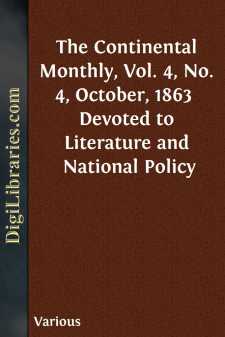Categories
- Antiques & Collectibles 13
- Architecture 36
- Art 48
- Bibles 22
- Biography & Autobiography 813
- Body, Mind & Spirit 142
- Business & Economics 28
- Children's Books 15
- Children's Fiction 12
- Computers 4
- Cooking 94
- Crafts & Hobbies 4
- Drama 346
- Education 46
- Family & Relationships 57
- Fiction 11828
- Games 19
- Gardening 17
- Health & Fitness 34
- History 1377
- House & Home 1
- Humor 147
- Juvenile Fiction 1873
- Juvenile Nonfiction 202
- Language Arts & Disciplines 88
- Law 16
- Literary Collections 686
- Literary Criticism 179
- Mathematics 13
- Medical 41
- Music 40
- Nature 179
- Non-Classifiable 1768
- Performing Arts 7
- Periodicals 1453
- Philosophy 64
- Photography 2
- Poetry 896
- Political Science 203
- Psychology 42
- Reference 154
- Religion 513
- Science 126
- Self-Help 84
- Social Science 81
- Sports & Recreation 34
- Study Aids 3
- Technology & Engineering 59
- Transportation 23
- Travel 463
- True Crime 29
The Continental Monthly, Vol. 4, No. 4, October, 1863 Devoted to Literature and National Policy
by: Various
Categories:
Description:
Excerpt
THE FREEDOM OF THE PRESS.
An important discussion has arisen since the commencement of the war, bearing upon the interests of the American Press. The Government has seen fit, at various times, through its authorities, civil and military, to suppress the circulation and even the publication of journals which, in its judgment, gave aid and comfort to the enemy, either by disloyal publications in reference to our affairs, or by encouraging and laudatory statements concerning the enemy. The various papers of the country have severally censured or commended the course of the Government in this matter, and the issue between the Press and the Authorities has been regarded as of a sufficiently serious nature to demand a convocation of editors to consider the subject; of which convention Horace Greeley was chairman. A few remarks on the nature of the liberty of the press and on its relations to the governing powers will not, therefore, at this time, be inopportune.
Men are apt, at times, in the excitement of political partisanship, to forget that the freedom of the press is, like all other social liberty, relative and not absolute; that it is not license to publish whatsoever they please, but only that which is within certain defined limits prescribed by the people as the legitimate extent to which expression through the public prints should be permitted; and that it is because these limits are regulated by the whole people, for the whole people, and not by the arbitrary caprice of a single individual or of an aristocracy, that the press is denominated free. Let it be remembered, then, as a starting point, that the press is amenable to the people; that it is controlled and regulated by them, and indebted to them for whatever measure of freedom it enjoys.
The scope of this liberty is carefully defined by the statutes, as also the method by which its transgression is to be punished. These enactments minutely define the nature of an infringement of their provisions, and point out the various methods of procedure in order to redress private grievance or to punish public wrong, in such instances. These statutes emanate from the people, are the expression of their will, and in consonance with them the action of the executive authorities must proceed, whenever the civil law is sufficient for the execution of legal measures.
But there comes a time, in the course of a nation's existence, when the usual and regular methods of its life are interrupted; when peaceful systems and civilized adaptations are forced to give place to the ruder and more peremptory modes of procedure which belong to seasons of hostile strife. The slow, methodical, oftentimes tedious contrivances of ordinary law, admirably adapted for periods of national quietude, are utterly inadequate to the stern and unforeseen contingencies of civil war. Laws which are commonly sufficient to secure justice and afford protection, are then comparatively powerless for such ends. The large measure of liberty of speech and of the press safely accorded when there is ample time to correct false doctrines and to redress grievances through common methods, is incompatible with the rigorous promptitude, energy, celerity, and unity of action necessary to the preservation of national existence in times of rebellion. If an individual be suspected of conspiring against his country, at such a time, to leave him at liberty while the usual processes of law were being undertaken, would perhaps give him opportunity for consummating his designs and delivering the republic into the hands of its enemies. If a portion of the press circulate information calculated to aid the foe in the defeat of the national armies, to endeavor to prevent this evil by the slow routine of civil law, might result in the destruction of the state. The fact that we raise armies to secure obedience commonly enforced by the ordinary civil officers is a virtual and actual acknowledgment that a new order of things has arisen for which the usual methods are insufficient, civil authority inadequate, and to contend with which powers must be exercised not before in vogue. Codes of procedure arranged for an established and harmoniously working Government cannot answer all the requirements of that Government when it is repudiated by a large body of its subjects, and the existence of the nation itself is in peril.
It is evident, therefore, that at times the accustomed methods of Civil government must, in deference to national safety, be laid aside, to some extent, and the more vigorous adaptations of Military government substituted in their stead. But it does not follow from this that arbitrary power is necessarily employed, or that such methods are not strictly legal. There is a despotic Civil government and a despotic Military government, a free Civil government and a free Military government. The Civil government of Russia is despotic; so would its Military government be if internal strife should demand that military authority supersede the civil; the Civil government of the United States is free, so must its Military government be in order to be sustained.
But what is a free Military government? There is precisely the same difference between a free and a despotic military polity as between a free and a despotic civil polity. It is the essential nature of despotic rule that it recognizes the fountain head of all power to be the ruler, and the people are held as the mere creatures of his pleasure....












